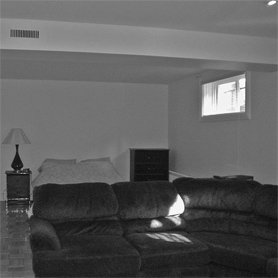What is the difference between a basement and a cellar?
• A basement is a story partly below curb level but having at least one-half of its height above the curb level.
• A cellar is an enclosed space having more than one-half of its height below curb level.
Can the cellar of a one- or two-family dwelling be lawfully rented?
No. A cellar CANNOT be lawfully rented.
Can the cellar of a one- or two-family dwelling be lawfully occupied?
Yes, but only by a current household member and under certain limited and specific conditions. Cellar rooms CANNOT be lawfully used for sleeping, eating, or primary cooking facilities by any member of the family or families who occupy a one- or two-family dwelling. However, a secondary kitchen for accessory cooking may be located in the cellar. Approval from the Department of Buildings must be obtained prior to installing a secondary kitchen in a cellar of a one- or two-family dwelling.
Can the basement of a two-family dwelling be lawfully rented?
No. The rental of a basement in a two-family dwelling would result in changing the status of the building to a multiple dwelling (three-family or more) and would require a new certificate of occupancy. If an owner is interested in renting the basement of their two-family dwellings, they must comply with all provisions of the New York State Multiple Dwelling Law applicable to dwellings erected after April 18, 1929.
Call 311 for more information on compliance.
Can the basement of a one-family dwelling be lawfully rented?
Yes, but only if all of the following conditions are met:
• Compliance with the requirements of the Housing Maintenance Code for rooms not located in the cellar or basement, e.g., minimum room size.
• There is a minimum ceiling height of seven feet.
• The walls, as high as ground level, must be damp-and water-proofed if HPD determines that subsoil conditions on the lot require such damp- and water-proofing.
• The basement is occupied by one family and does NOT include boarders.
• Every room must have at least one window complying with the requirements of Housing Maintenance
Code § 27-2062.
• The bottom of any yard or other required open space cannot be higher than six inches below the window sill of any required window in the room.
May the basement of a one-or two-family dwelling be lawfully occupied?
Yes, but only by members of the family or families occupying the dwelling and only if the following conditions are met:
• The room complies with the requirements of the Housing Maintenance Code for rooms not located in the cellar or basement, e.g., minimum room size.
• There is a minimum ceiling height of seven feet.
• The walls, as high as ground level, must be damp- and water-proofed if HPD determines that subsoil conditions on the lot require such damp- and water-proofing.
Who should I call to file a complaint about an illegal basement or cellar apartment? Where will my complaint be directed?
Complaints concerning illegal basement or cellar apartments should be directed to the City’s Citizen Service Center at 311. Complaints concerning illegal basement or cellar apartments are directed to the New York City Department of Buildings.
How does HPD get involved with illegal basement or cellar apartments in one and two-family dwellings?
HPD’s involvement with illegal basement and cellar apartments usually occurs when housing inspectors observe an illegal basement or cellar apartment when performing an inspection in response to a housing maintenance complaint.
What type of HPD violations will be issued for illegal occupancy of a basement or cellar?
HPD violations issued for illegal occupancy of a basement or cellar apartment are class “B” hazardous violations.
What are the civil penalties for HPD violations issued for illegal occupancy of a basement or cellar?
Civil penalties, which may be imposed by the Court, range from $25 to $100 plus $10 per day from the date set for correction in the notice of violation until the date the violation is corrected.
How does HPD enforce the law concerning illegal basement or cellar apartments in one- and two-family dwellings?
After inspection of an illegal basement or cellar apartment, inspectors from HPD’s Division of Code Enforcement will issue appropriate violations and may, if conditions warrant, issue an Order to Repair/Vacate Order.
When will an Order to Repair/Vacate Order be issued for an illegal basement or cellar apartment in a one- or two-family dwelling?
An Order to Repair/Vacate Order may be issued for numerous reasons. Two reasons often cited in an Order to Repair/ Vacate Order for an illegal basement or cellar apartment are inadequate means of egress and inadequate light and ventilation.
What will happen if HPD issues an Order to Repair/Vacate Order?
When an Order to Repair/Vacate Order is issued, HPD will notify the owner and occupants and will provide them with an enforcement date. On the date scheduled for enforcement, HPD will re-inspect the premises to verify that the illegal basement or cellar apartment is vacant and properly sealed.
How does an owner get the Order to Repair/Vacate Order rescinded or removed?
The owner, after correcting the conditions detailed in the Order to Repair/Vacate Order, must have the premises inspected by HPD to verify correction. A “Dismissal Request Inspection” form may be obtained from any HPD Code Enforcement Borough office and must be submitted along with the requisite fee to the Code Enforcement Borough office in the borough where the dwelling is located.
Once the correction is verified by HPD, the Order to Repair/Vacate Order will be rescinded. A “rescind letter” will be mailed to the owner.



